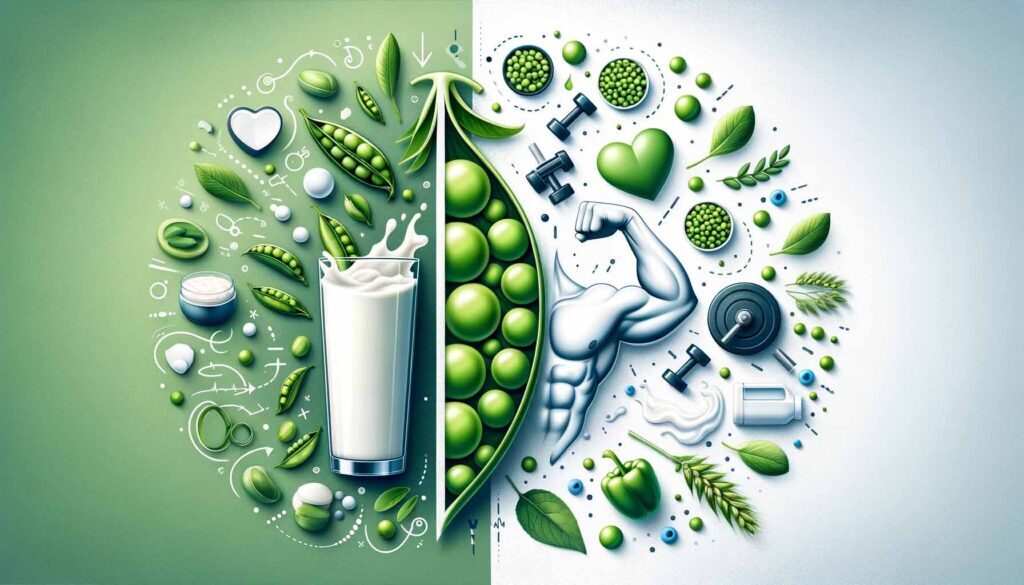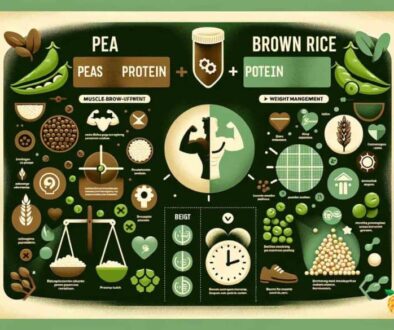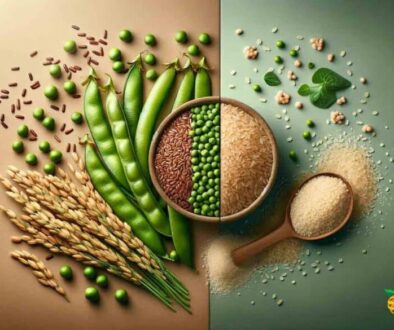Pea Protein vs. Whey Protein: A Comprehensive Comparison for Health Enthusiasts
Explore the detailed comparison between Pea Protein and Whey Protein, focusing on nutrition, digestibility, and ETprotein’s sustainable choice.
Introduction: In the health and fitness world, protein supplements are a cornerstone for nutritional support, with Pea Protein and Whey Protein emerging as popular options. While Whey Protein has long been the go-to choice for many, Pea Protein is gaining traction, thanks to its plant-based origin and health benefits. This article compares these two protein powerhouses in various aspects to help you make an informed choice.
1. Nutritional Profile:
- Pea Protein: Derived from yellow peas, this plant-based protein is rich in essential amino acids, particularly arginine, which promotes heart health and blood flow. Pea protein typically offers about 15 grams of protein per serving, along with a good amount of iron and is often enriched with other nutrients.
- Whey Protein: A by-product of cheese production, whey protein is a complete protein, meaning it contains all nine essential amino acids. It is particularly high in branched-chain amino acids (BCAAs), crucial for muscle building. A standard serving can offer up to 25 grams of protein.
- Comparison: While both provide high-quality protein, whey has a slight edge in protein quantity per serving and BCAA content. However, pea protein’s amino acid profile is more heart-friendly.
2. Digestibility and Allergenic Potential:
- Pea Protein: Easy to digest and typically free from major allergens, making it an excellent choice for those with sensitivities to dairy or gluten.
- Whey Protein: High biological value, meaning it’s efficiently absorbed and used by the body. However, it contains lactose, posing issues for those with lactose intolerance.
- Comparison: Pea protein is more inclusive, catering to a broader audience with dietary restrictions.
3. Muscle Building and Recovery:
- Pea Protein: Studies suggest that pea protein can be as effective as whey in building muscle mass, especially when consumed post-workout.
- Whey Protein: Known for its rapid absorption, whey protein is ideal for post-exercise recovery and muscle synthesis.
- Comparison: While whey might lead in absorption speed, pea protein is a formidable plant-based alternative for muscle building.
4. Environmental and Ethical Considerations:
- Pea Protein: Has a lower environmental footprint, requiring less water and land than animal-based proteins. Its vegan nature also appeals to those seeking ethical dietary choices.
- Whey Protein: Dairy-based, thus carrying a higher environmental impact in terms of water usage, land requirement, and greenhouse gas emissions.
- Comparison: Pea protein is a more sustainable and eco-friendly option compared to whey protein.
5. Taste, Texture, and Usability:
- Pea Protein: Has a distinct taste and thicker texture, which can be masked or enhanced depending on the recipe. It’s versatile in smoothies, baked goods, and more.
- Whey Protein: Generally considered more palatable with a smoother texture. It’s also widely used in various food products.
- Comparison: While whey may win in taste and texture for some, pea protein’s versatility in cooking is noteworthy.
6. Suitability for Different Diets:
Pea protein is ideal for those on vegan, vegetarian, or dairy-free diets, while whey protein suits those without dairy sensitivities and follows a more traditional diet. Both can fit into various dietary plans, depending on individual needs and preferences.
Conclusion:
Both Pea Protein and Whey Protein offer unique benefits. Your choice should depend on factors like dietary restrictions, environmental concerns, and personal health goals. Whether you’re looking for a plant-based protein source or a protein rich in BCAAs, both these proteins have their merits.
As we conclude this comparison, we highly recommend ETprotein’s Pea Protein for those seeking a sustainable, allergen-friendly, and effective plant-based protein supplement. With its high-quality ingredients and commitment to health and the environment, ETprotein’s Pea Protein stands out as a top choice for health enthusiasts. If you need to know more information, feel free to email sales(at)ETprotein.com for assistance.












